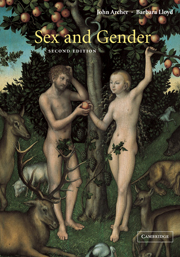Book contents
- Frontmatter
- Contents
- List of figures
- List of tables
- Preface
- 1 Commonsense beliefs and psychological research strategies
- 2 Stereotypes, attitudes, and personal attributes
- 3 Origins
- 4 Developmental influences
- 5 Sexuality: psychophysiology, psychoanalysis, and social construction
- 6 Aggression, violence, and power
- 7 Fear, anxiety, and mental health
- 8 The domestic sphere
- 9 Work, education, and occupational achievement
- 10 Looking back and looking ahead
- References
- Index
4 - Developmental influences
Published online by Cambridge University Press: 11 May 2012
- Frontmatter
- Contents
- List of figures
- List of tables
- Preface
- 1 Commonsense beliefs and psychological research strategies
- 2 Stereotypes, attitudes, and personal attributes
- 3 Origins
- 4 Developmental influences
- 5 Sexuality: psychophysiology, psychoanalysis, and social construction
- 6 Aggression, violence, and power
- 7 Fear, anxiety, and mental health
- 8 The domestic sphere
- 9 Work, education, and occupational achievement
- 10 Looking back and looking ahead
- References
- Index
Summary
Introduction
There are two sources of influence on psychological development, heredity and the environment. Although they can be separated conceptually, from the viewpoint of the developing child they form a continuous interaction throughout life. We tend to think of environmental influences beginning at birth, but they also exert their influence before this, in the womb. We also tend to think of heredity as having its impact early in life, but it can operate throughout life.
Many commonsense explanations, and psychological theories, have emphasised either the environment or heredity as the dominant influence in development. Arguments over their relative importance are known as the nature–nurture issue, and are apparent in the writings of the earliest Western philosophers and throughout the history of modern psychology. Utopian political systems have been built around the notion that, if only humans were given the appropriate environment, they would live in peace and harmony. American behaviourist psychology emphasized learning as the route to human perfectibility, and the legacy of this influence can be seen in social and developmental psychology today. Others writing about the human condition, notably Sigmund Freud and the ethologist Konrad Lorenz, have countered the notion of human malleability by arguing that the human species possesses innate destructive impulses.
The pervasive influence of the nature–nurture issue is evident in accounts of the development of psychological characteristics associated with the sexes. The debate is bound up with views about whether it is possible, by means of an appropriate upbringing, to rear boys who are non-sexist in outlook and peaceful in behaviour, or girls who are assertive as well as nurturant.
- Type
- Chapter
- Information
- Sex and Gender , pp. 59 - 83Publisher: Cambridge University PressPrint publication year: 2002



